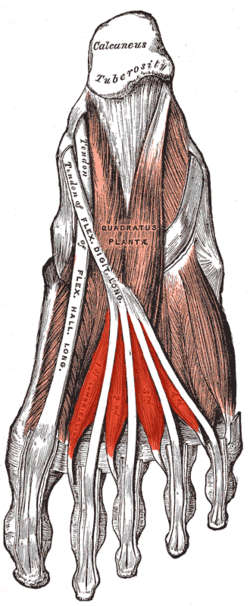Lumbricals of the foot
Four small skeletal muscles From Wikipedia, the free encyclopedia
Four small skeletal muscles From Wikipedia, the free encyclopedia
The lumbricals are four small skeletal muscles, accessory to the tendons of the flexor digitorum longus muscle. They are numbered from the medial side of the foot.[1]
This article includes a list of references, related reading, or external links, but its sources remain unclear because it lacks inline citations. (May 2015) |
| Lumbrical muscle of the foot | |
|---|---|
 Muscles of the sole of the right foot, viewed from below. Second layer. (Lumbricals visible at bottom.) | |
| Details | |
| Origin | Medial borders of long flexor tendons |
| Insertion | Proximal phalanges and extensor tendons of the 4 lateral toes |
| Artery | Medial and lateral plantar arteries |
| Nerve | Medial and lateral plantar nerves (S3) |
| Actions | Flexes metatarsophalangeal joints, extends interphalangeal joints |
| Identifiers | |
| Latin | musculus lumbricalis pedis |
| TA98 | A04.7.02.069 |
| TA2 | 2685 |
| FMA | 37453 |
| Anatomical terms of muscle | |
The lumbricals arise from the tendons of the flexor digitorum longus muscle,[1] as far back as their angles of division, each springing from two tendons, except the first. The first lumbrical is unipennate, while the second, third and fourth are bipennate.
The muscles end in tendons, which pass forward on the medial sides of the four lesser toes, and are inserted into the expansions of the tendons of the extensor digitorum longus muscle on the dorsal surfaces of the proximal phalanges.[1] All four lumbricals insert into extensor hoods of the phalanges, thus creating extension at the inter-phalangeal (PIP and DIP) joints. However, as the tendons also pass inferior to the metatarsal phalangeal (MTP) joints it creates flexion at this joint.
The most medial lumbrical is innervated by the medial plantar nerve while the remaining three lumbricals are supplied by the lateral plantar nerve.
Absence of one or more; doubling of the third or fourth even the fifth. Insertion partly or wholly into the first phalanges.
The term "lumbrical" comes from the Latin, meaning "worm".[1]
Seamless Wikipedia browsing. On steroids.
Every time you click a link to Wikipedia, Wiktionary or Wikiquote in your browser's search results, it will show the modern Wikiwand interface.
Wikiwand extension is a five stars, simple, with minimum permission required to keep your browsing private, safe and transparent.